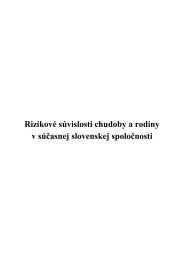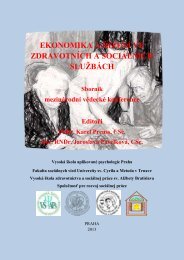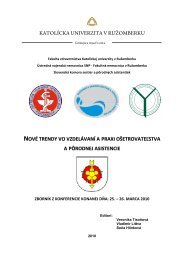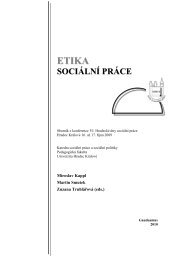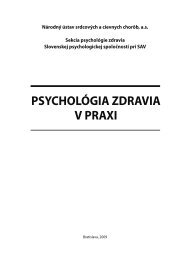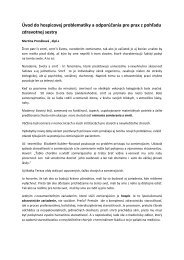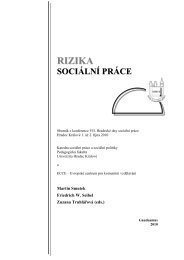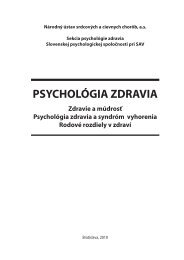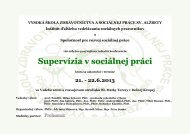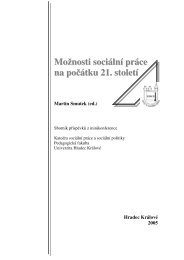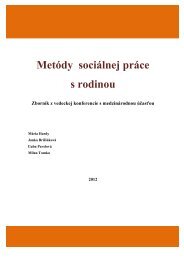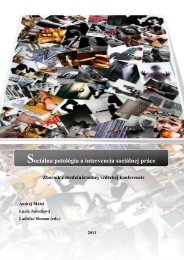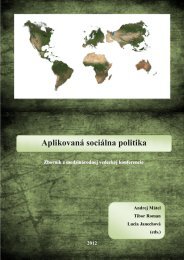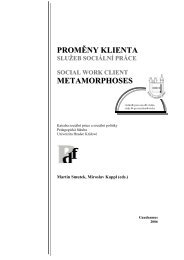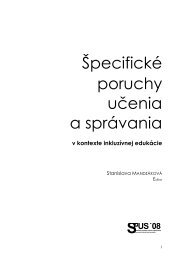Zmena klÃmy â možný dopad (nielen) na obyvateľstvo - Prohuman
Zmena klÃmy â možný dopad (nielen) na obyvateľstvo - Prohuman
Zmena klÃmy â možný dopad (nielen) na obyvateľstvo - Prohuman
Create successful ePaper yourself
Turn your PDF publications into a flip-book with our unique Google optimized e-Paper software.
esearch highlights the extent to which very young children have begun to form<br />
stereotypical ideas of African countries and made associations between Africa<br />
and poverty. These ideas tended to domi<strong>na</strong>te children’s conceptions of African<br />
countries and African people even when they were exposed to positive images as<br />
part of the research process.<br />
The importance of family experiences and the influence of the media were exemplified<br />
by a child whose family was subscribing to a child sponsorship scheme<br />
in Africa and whose parents had explained their ratio<strong>na</strong>le for doing so. Her description<br />
of life in Africa draws heavily on this ratio<strong>na</strong>le. “In Africa, nobody can<br />
get no food, they have no sheep, no cows…we have to help the people in Africa”<br />
(Pupil, Junior Infant class)<br />
This highlights how child sponsorship schemes and the media provide some<br />
children with an awareness of the wider world. They may also instill an essentialist<br />
view that Africa is poor and we have the means and responsibility to provide<br />
solutions.<br />
Most significantly, the research identified starting points to inform global citizenship<br />
education programmes for young children. The findings suggest young<br />
children have the capacity to engage with complex issues of justice and fairness<br />
when appropriate strategies and methodologies are used.<br />
Results of Phase Two<br />
The participant educators involved with the second phase of the research recorded<br />
a variety of activities done with their children as part of this research process.<br />
An a<strong>na</strong>ylsis of the focus group meetings, the structured diaries and the pupils’<br />
work suggested that while all participants had used the story book and encouraged<br />
child engagement with the story, the degree to which they engaged children<br />
with issues of global justice varied considerably. Furthermore, the results<br />
also highlight the possibility of learning outcomes which were contrary to the<br />
programme’s objectives.<br />
From an a<strong>na</strong>lysis of the data, four participant responses emerged: engaging<br />
with the storybook without explicitly exploring global justice issues; exploring the<br />
concept of fairness; using existing intercultural, environmental or development<br />
education resources (aimed at young children or modified from those aimed at<br />
older children); and teaching about Kenya.<br />
• No Explicit Global Justice Exploration<br />
Several of the participating educators used the storybook as a stimulus for cross<br />
curricular work which encouraged engagement with the book and supported<br />
172



